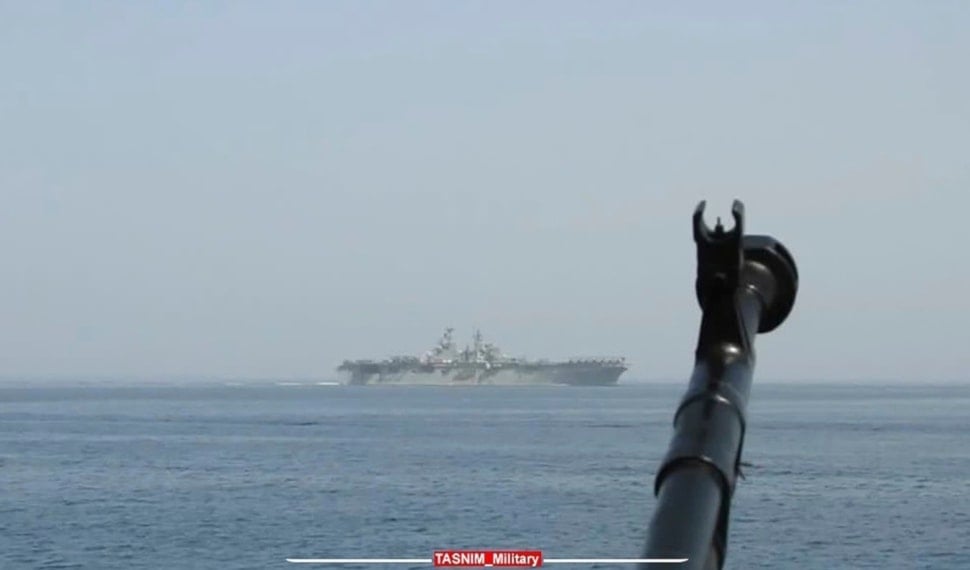US-led group warns of GPS jamming threatening Hormuz Strait navigation
The US-led Combined Maritime Forces reports rising electronic interference near Bandar Abbas and the Gulf amid Iran-"Israel" tensions, posing a growing risk to commercial shipping in the Strait of Hormuz.
-

In this image provided by the Iranian Revolutionary Guard via Tasnim News Agency on Sunday, Aug. 20, 2023, a machine gun's muzzle of a Revolutionary Guard speedboat is seen as the boat moves near USS Bataan at the Strait of Hormuz. (AP)
The Combined Maritime Forces (CMF), a US-led multinational naval coalition, has issued a warning about increasing electronic interference in the Strait of Hormuz and the Arabian Gulf. This comes amid rising tensions between Iran and "Israel" that are consequently intensifying regional instability.
The CMF’s Information Fusion Centre reported that the Joint Monitoring and Assessment Committee continues to receive data on electronic interference originating from areas near the Iranian port of Bandar Abbas, as well as other parts of the Gulf and Southeast Asia. These disruptions are impacting commercial vessels’ GPS accuracy and hindering the effectiveness of Automatic Identification Systems (AIS).
The center warned that this electronic interference directly affects shipping operations, complicating navigation in a region that serves as a crucial corridor for global energy transport. The Strait of Hormuz is one of the world's most strategically significant maritime routes, and such challenges pose a serious threat to international shipping.
UKMTO issues similar advisory
Coinciding with the CMF alert, the UK Maritime Trade Operations (UKMTO) also released a bulletin noting a sharp rise in unidentified electronic interference in the Gulf. The warning further underscores the growing operational risks in the area.
The CMF concluded that the overall regional threat level remains high, with ongoing hostilities between Iran and "Israel" exacerbating vulnerabilities in one of the most sensitive maritime corridors in the world.
Analysts warn of possible disruptions in Strait of Hormuz
The Strait of Hormuz, through which roughly 20 million barrels of oil flow daily, remains one of the world’s most critical oil chokepoints. MST Marquee energy analyst Saul Kavonic warned that while the current market impact is speculative, any retaliation by Iran targeting infrastructure or restricting transit through the strait could cause serious disruptions.
“In an extreme scenario, Iran could hinder up to 20 million barrels per day of oil supply,” Kavonic said, noting that this would require a major escalation in hostilities.
In March, the Commander of the Navy in the Iranian Revolutionary Guard Corps Alireza Tangsiri warned that "Iranian combat units are at the highest level of readiness in the Strait of Hormuz, monitoring all enemy movements and not losing sight of them for a moment," noting that in the case of battles breaking out, "the enemies will receive strikes from where they least expect."
Read more: Iran warns of untapped missile power, to continue strikes on 'Israel'

 3 Min Read
3 Min Read









